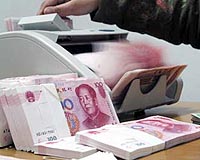 |
Yokohama, Japan (AFP) Nov 10, 2010 Japan's foreign minister said Wednesday global trade talks should tackle restrictions to exports as well as to imports, weeks after China choked off crucial rare earth shipments to Japan. Seiji Maehara said he made the comments to his counterparts in the 21-member Asia Pacific Economic Cooperation (APEC) forum who met in Yokohama near Tokyo, ahead of the bloc's weekend summit. China has since late September restricted exports to Japan of rare earth metals that are used in a range of high-tech products, industry sources have reported, amid a bitter territorial row between the Asian giants. It reportedly also slowed shipments to the United States and elsewhere. Japan's Prime Minister Naoto Kan and US President Barack Obama are expected to discuss the issue when they meet on the sidelines of the summit. Maehara, after meeting other APEC ministers Wednesday, told reporters that restrictions on exports should be discussed at APEC and the World Trade Organisation (WTO). "In my remarks, I said the discussion of the WTO has long focused on restrictions on imports," he said. "But we need to discuss restrictions on exports in WTO meetings, I proposed, when we face shortages of resources and foodstuffs due to the increasing (world) population." "I hope we can have such discussions in upcoming WTO or APEC meetings." On the sidelines of the meeting, Japanese trade minister Akihiro Ohata agreed with US Deputy Secretary of State Jim Steinberg to work together to secure rare earth minerals, a Japanese government official said. "Minister Ohata said he would like to exchange views and cooperate in developing alternatives and recycling rare earths," the official said, adding that both sides agreed to reconsider their heavy reliance on Chinese rare earths. China controls more than 95 percent of the global market in rare earths. Beijing has repeatedly denied it has cut off exports of the crucial metals and said it would not use its near-global monopoly as a "bargaining tool". The group of 17 elements are used in products ranging from flat-screen televisions, mobile phones, lasers and hybrid cars to military equipment such as missiles, jet engines and night-vision goggles. Maehara's comments also pointed to long-standing worries over food security in Japan, which imports more than half its food by calorie count, a concern heightened after dramatic spikes in grain prices in recent years. APEC ministers meeting in Japan last month warned that "global food security stands at a crossroads. The food price spike in 2007 and 2008 served as a wake-up call about the vulnerability of long-term food security".
Share This Article With Planet Earth
Related Links Global Trade News
 China trade surplus adds to pressure over yuan ahead of G20
China trade surplus adds to pressure over yuan ahead of G20Beijing (AFP) Nov 10, 2010 China's trade surplus grew in October as both exports and imports rose on-year, the government said Wednesday, adding to pressure on Beijing ahead of the G20 summit to let its currency appreciate. The trade surplus expanded to 27.15 billion dollars in October, customs authorities said, before a Group of 20 summit in Seoul that is expected to focus on rebalancing the skewed global economy. ... read more |
|
| The content herein, unless otherwise known to be public domain, are Copyright 1995-2010 - SpaceDaily. AFP and UPI Wire Stories are copyright Agence France-Presse and United Press International. ESA Portal Reports are copyright European Space Agency. All NASA sourced material is public domain. Additional copyrights may apply in whole or part to other bona fide parties. Advertising does not imply endorsement,agreement or approval of any opinions, statements or information provided by SpaceDaily on any Web page published or hosted by SpaceDaily. Privacy Statement |